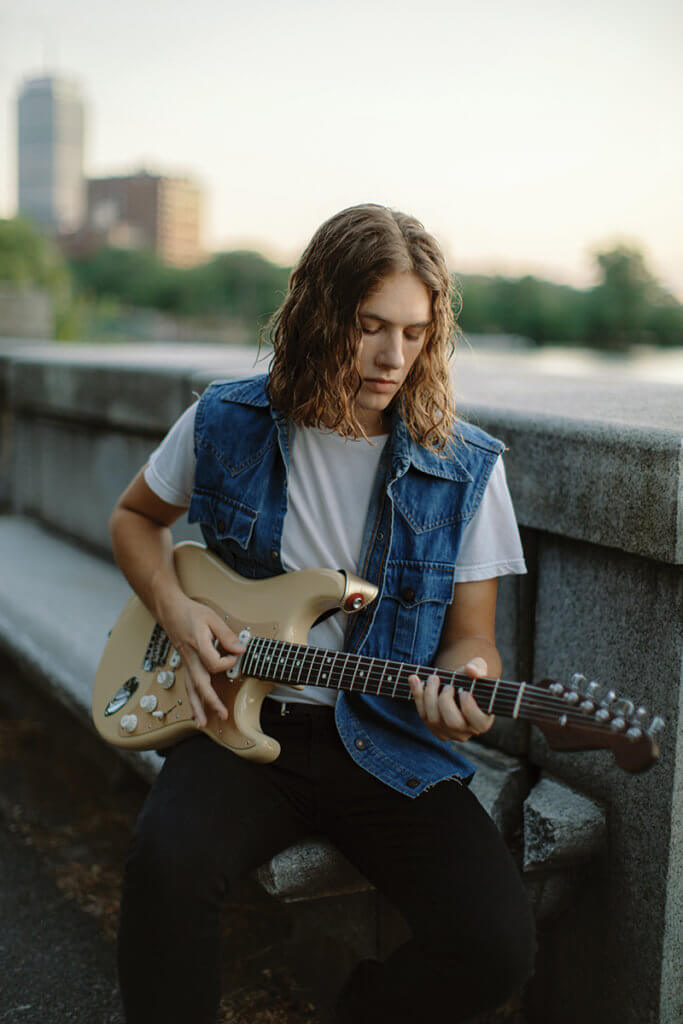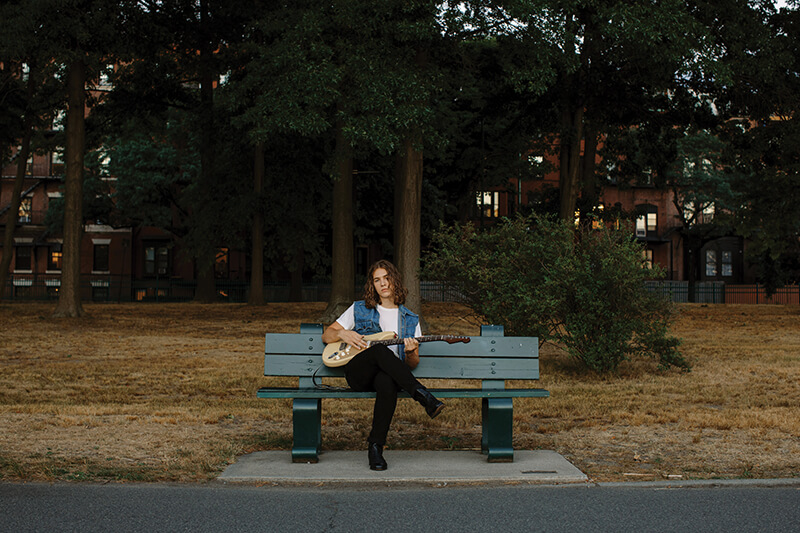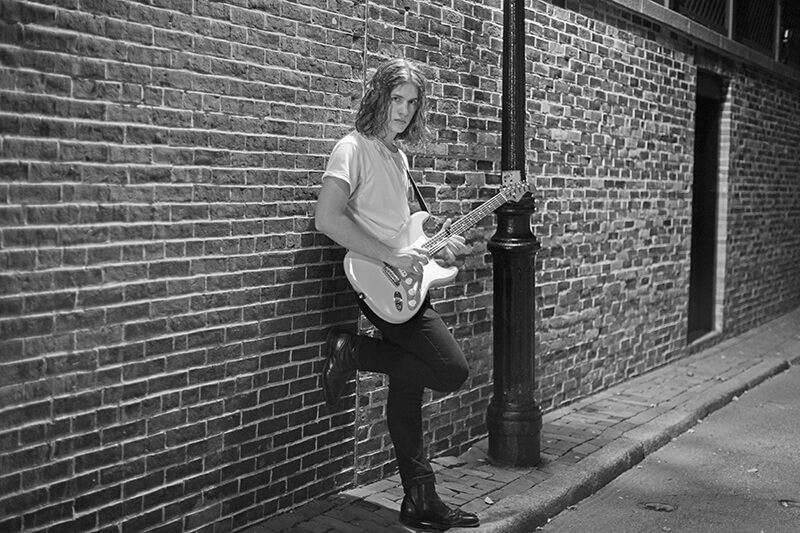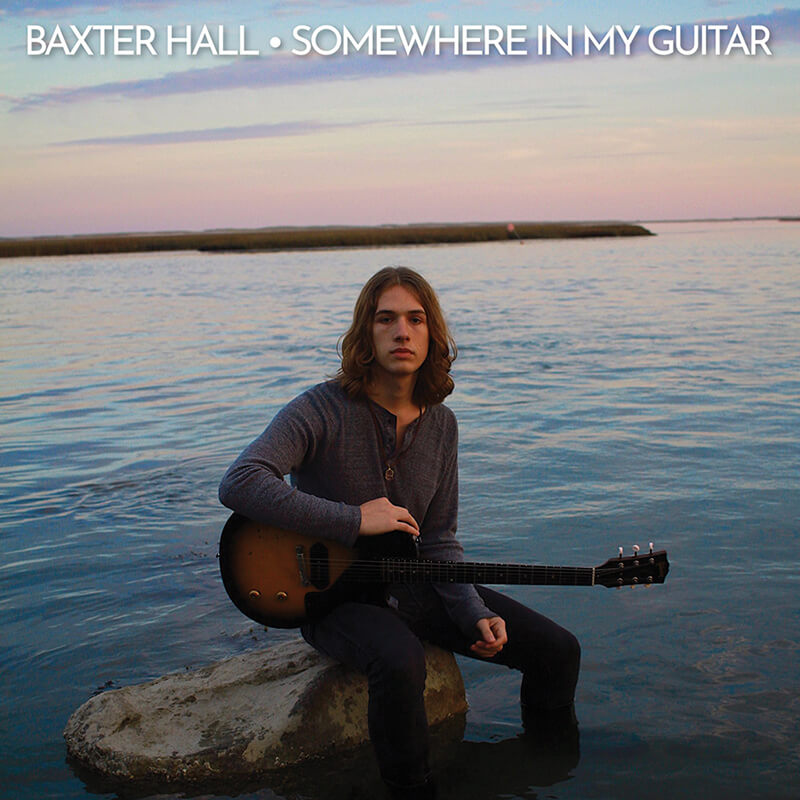Baxter Hall may be young, but his love for soulful guitar-based music and vintage gear belies his tender age.
We recently had an opportunity to work with the gifted axe-slinger as part of our Elixir Strings artist of the month program, so be sure to watch some of the videos he shared on our social media pages as well as our YouTube channel.
During his featured month, we also had a chance to sit down and chat more in-depth about his influences, his gear and where his career is headed….
So, we’d love to get to know you a little bit better.
Sure, well I’m from Boston and music has always been a part of my life. It’s some of my earliest memories. In some ways I came from a very musical family, many generations back people played instruments and I always remember growing up hearing a lot of music by Crosby, Stills, Nash and Joni Mitchell and The Beatles and some James Brown around the house, which was mostly through my parents, but also just through being around music and musicians.
When I was 12 years old, I found a Stratocaster in my grandparents’ [house]. Every day after school I couldn’t wait to go back and play guitar and I would just teach myself different Beatles songs that I would learn by ear. Eventually I ended up taking some lessons with many, many great teachers around New England and gaining some guitar vocabulary that way.
It sounds like a lot of your earliest influences around the house were late 60s pop and rock. Like the Laurel Canyon sound?
That kind of Crosby, Stills Nash, Joni Mitchell type thing? Definitely, definitely. Laurel Canyon? I get that. Like I light up a little bit [when I hear that phrase] because of the folk scene and a lot of songwriters [from that era]. Yeah, I just remember from a very young age being really fascinated with crafting songs and how people communicated through songs; I remember being really mesmerized by that.
Were you starting to write at first or did guitar playing came first and then writing came later?
I would like to say that the guitar playing came first but I actually think that songwriting and the love for songwriting has always been there. Songwriting started coming in around 15, you know, it started with little things, like “I got this idea,” and I would show it to some of my friends. We played in a band in high school and [I] started writing that way and then around 16/17 I started getting into lyrics and exploring that side of me, as well.
Cool, I’d like to go back to the guitar thing, since that’s how a lot of folks come to know you. You said you picked up this Strat at a young age, and I see it still in a lot in your videos and in your social media. You want to walk us through some of your other favorite guitars too?
Sure, of course. That’s the thing that’s been a passion of mine since I was maybe 12 or 13 and I’ve been really interested in all the different guitar models and all that, so… The instrument that that I love right now that I’m using so much and just can’t put it down is a Fender Stratocaster with an all-rosewood neck.

Oh, OK. Let’s talk rosewood!
There’s just something about the sound of an all-rosewood neck seems very magical to me, and it looks amazing. I also have a 50s Gretsch Country Club, which was converted into a White Falcon model sometime in the 70s. Someone did the conversion on that well before I got it. I think they did it in the 70s or so because obviously the White Falcon was such a popular model with Gretsch. I remember seeking that model out because I’m a huge Neil Young fan…
That’s a big old hollowbody, right?
Yes, yeah, it’s completely hollow and it sounds great. I also have a 55 Les Paul Junior, which I love, and I got that maybe when I was 17 or so.
Now that’s a real, we’re talking real 50’s — not like a re-issue or something?
Yes, so it’s a real 1955 and like I said, this sort of came from diving into this passion for vintage instruments since a young age.
I came across it at Empire Guitars in Providence, RI.
Oh yeah, I love them.
Another model I should mention is my Fender Acoustasonic.

Now tell me about this ’cause this is a relatively recent addition to the Fender lineup, and I think I’ve seen people divided online whether they like it or not.
Well, the Acoustasonic came into my life in a very natural way in the sense that I was writing songs where I wanted an acoustic sound and then I wanted to switch to an electric sound to play a solo and before this guitar, I don’t know. I would just play it all on electric and it wouldn’t really like serve the song like I wanted it to.
Right.
Speaking from a songwriter’s a perspective, I really think that this is such a versatile instrument, especially with all the different acoustic sounds it has and being able to switch to an electric sound. Yeah, it just, it just does it for me. It’s kind of like what I was searching for this whole time.
Did I see a Silvertone sneak in the collection, too? Or am I imagining things?
I do. I have an old Silvertone, as well.
Talk to me about that ’cause that’s a cool guitar that people sleep on.
Yeah, I know. And it has that one kind of lipstick pickup that’s so good. I’ve had that guitar for a while. It was one of the first guitars I ever got, which I know is kind of funny because a lot of people growing up in the 50s and 60s usually talk about Silvertone and the whole thing with Sears and it being their first guitar and everything. But I actually, you know, I kind of share in on that [even at my age]. Yeah, it was just this cool guitar I saw in a guitar shop, and I’m telling you, every time I pick up that guitar and plug it in, it really just like never disappoints; it just has a really loud rocking sound with that one pickup.

Like on a lot of my guitars, I’ve never really had a preference as far as like, oh, I need the action to be this way or [something]. I started to play vintage instruments from a young age and so when I would pick it up, the guitar was as it was and it was a little bit of a struggle or whatever, but you kind of just adapt to it. And yeah, something about that that’s kind of, that’s kind of been my preference – it’s OK if the guitar is a little beat up, if it’s not perfectly intonated or whatever, that just kind of goes with some of that punk energy I like to channel through my [work]. I always feel like it’s more the player than the instrument.
Yeah, you’re not forgetting the main point, which is that the music is supposed to matter, right? Not just the gear. Can you kind of get us into your headspace, and explain what the songwriting process looks like for you?
Early in my songwriting journey, I wasn’t making the connection between my emotions and songwriting, and hadn’t yet made that connection early, early on when I was maybe 16 or 17.

But over the past two years I’ve been taking a step back. I found myself writing a lot of songs about different relationships that we find ourselves in, like how others make us feel, how we want to make others feel, and just relating to who we are as people.
I have some music coming out in the fall, and on a lot of these new songs that everyone will hear soon there’s a connection between relationships and social interaction, that I found to be a huge theme in my own life over the past two or three years.
Follow on Instagram @_baxterhall_
Photos by Adriana Arguijo Gutierrez
